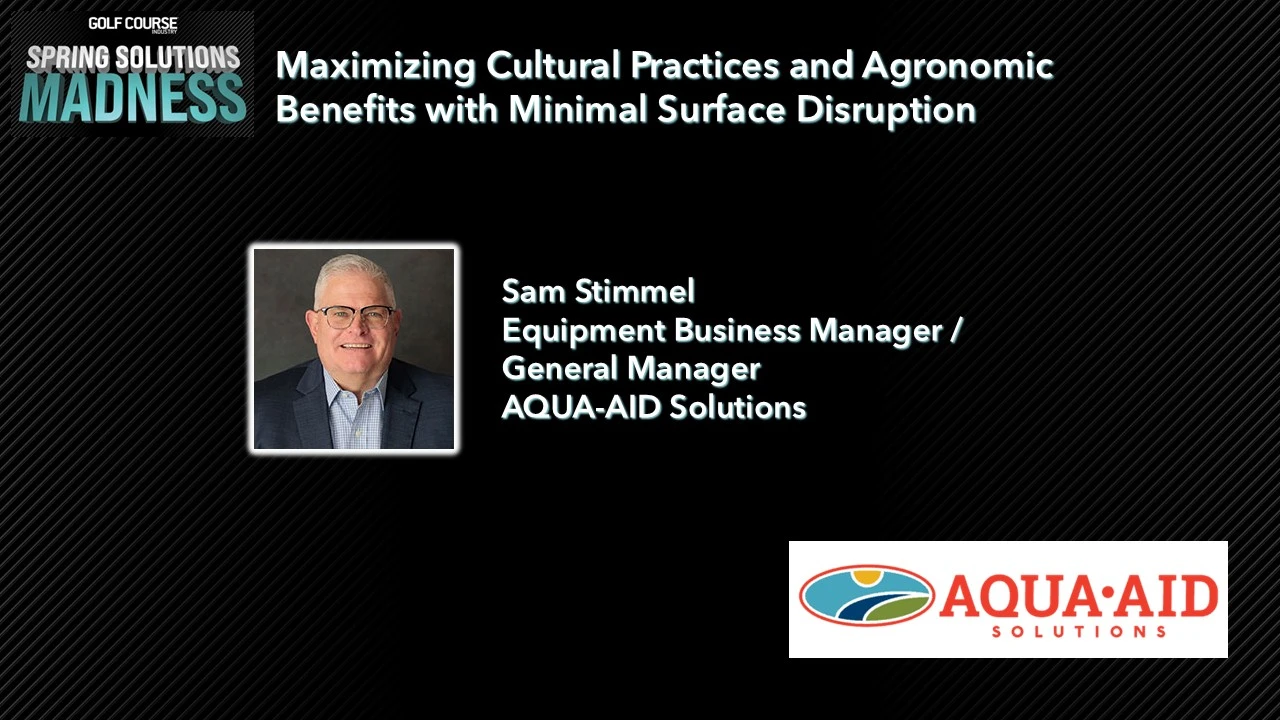
I have lived by the above words for the majority of my career. Early in my current tenure, they were shared by a former club president. I think about them often when situations arise where I’m away from the facility. Folks don’t send back food to the kitchen with a complaint to the sous-chef. They complain to the person whose name is on the restaurant.
Similarly, if someone has a complaint about course conditions, they don’t complain to the assistant superintendent. They bring it to the attention of the head greenkeeper, superintendent or course manager.
If you can’t trust your team with the “keys to the car” for a week, then either you have hired the wrong people or you have done a poor job training them. I understand some of you can’t get away during the busiest time of year. But for a little over a decade, I have strived to allow myself and members of our team the opportunity to recharge.
Time passes so quickly nowadays; the week is practically over before we begin to stress about how to get things done without someone. Recently, I planned to take a Friday and Saturday off to participate in a hickory golf event. I have an affinity for hickory golf, but one thing I have yet to do is participate in an actual competition. I was looking forward to finally having that chance when the unthinkable happened.
Our pump station went down at approximately 2:45 a.m. the morning of the first round of the Carolina Hickory Open. I was sleeping two hours west of Charlotte, eagerly awaiting a 9 a.m. tee time. When I received the text message from our senior assistant, I immediately confirmed via email that the issue was a phase imbalance, meaning the problem most likely resided with our electric service provider.
To make matters worse, not only were we dealing with this issue on the morning of what was forecast to be a typical summer day in the Carolinas, but my remote location inhibited our ability to communicate freely with each other. Unable to make or receive a call and relying solely on text messages with both our senior assistant and equipment manager, I found my anxiety level rising. I worked extra hours in advance of these two days to make things as easy as possible on our team during my brief absence.
I was now attempting to shoulder the burden from miles away by texting instructions, only to face the uncertainty of the unknown. When will our team be able to contact our service provider and explain the situation? When will our service provider arrive to correct the issue? How long will the repair take?
After about an hour and a half of back-and-forth, I decided to withdraw from the event and return to the course as quickly as possible. After about 20 minutes of driving, I finally had a clear enough signal to speak with our senior assistant and be briefed on the situation. He managed to contact our service provider and was waiting on their arrival, though there was no ETA.
We filled our greens sprayer and applied water to all greens to help hold onto whatever moisture was present from the previous day. Rainfall had been scarce and ET rates were high. The days were the longest of the year.
I drove faster and waited to hear back. My mind continued to fabricate other strategies we could employ should the worst-case scenario emerge.
Then, about the time I would have been teeing off in the first round of the event, I received word our service provider was on site making the necessary repair. A few minutes later, I received word the pump station was back online and greens were being irrigated.
I was proud of our team … and disappointed in myself. Did I not trust my team to bear the load in my absence? Had I not prepared them for these types of events? Why did I not trust they would handle it flawlessly and why did I not carry on with my plan to participate in the event?
I would like to think the inability to remain connected played a significant role in my actions, but we will never know.
Sponsored Content
Labor that Works
With 25 years of experience, Leadpoint delivers cost-effective workforce solutions tailored to your needs. We handle the recruiting, hiring, training, and onboarding to deliver stable, productive, and safety-focused teams. Our commitment to safety and quality ensures peace of mind with a reliable workforce that helps you achieve your goals.
Sponsored Content
Labor that Works
With 25 years of experience, Leadpoint delivers cost-effective workforce solutions tailored to your needs. We handle the recruiting, hiring, training, and onboarding to deliver stable, productive, and safety-focused teams. Our commitment to safety and quality ensures peace of mind with a reliable workforce that helps you achieve your goals.
Sponsored Content
Labor that Works
With 25 years of experience, Leadpoint delivers cost-effective workforce solutions tailored to your needs. We handle the recruiting, hiring, training, and onboarding to deliver stable, productive, and safety-focused teams. Our commitment to safety and quality ensures peace of mind with a reliable workforce that helps you achieve your goals.
Sponsored Content
Labor that Works
With 25 years of experience, Leadpoint delivers cost-effective workforce solutions tailored to your needs. We handle the recruiting, hiring, training, and onboarding to deliver stable, productive, and safety-focused teams. Our commitment to safety and quality ensures peace of mind with a reliable workforce that helps you achieve your goals.
Sponsored Content
Labor that Works
With 25 years of experience, Leadpoint delivers cost-effective workforce solutions tailored to your needs. We handle the recruiting, hiring, training, and onboarding to deliver stable, productive, and safety-focused teams. Our commitment to safety and quality ensures peace of mind with a reliable workforce that helps you achieve your goals.
Folks say all the time they desire the opportunity and ability to unplug. I believe that to be a false claim. I think what we desire is the ability to get away yet remain connected, because the ability to communicate openly and freely without interruption allows one to fully assess the situation at hand and know that everything is being handled accordingly.
Consider me in this category.
Get curated news on YOUR industry.
Enter your email to receive our newsletters.

Explore the August 2022 Issue
Check out more from this issue and find your next story to read.
Latest from Golf Course Industry
- AQUA-AID Solutions bolsters Sunshine State presence
- Escalante Golf acquires secluded Illinois course
- Tartan Talks 105: Nathan Crace and Todd Quitno
- Disease Discussion 24: Let the turf talk to you
- From the publisher’s pen: Foggy intrigue
- USGA releases Water Conservation Playbook
- Vilamoura Golf courses awarded GEO Certified status
- GCSAA’s Health in Action 5K/2K reaches fundraising goal






